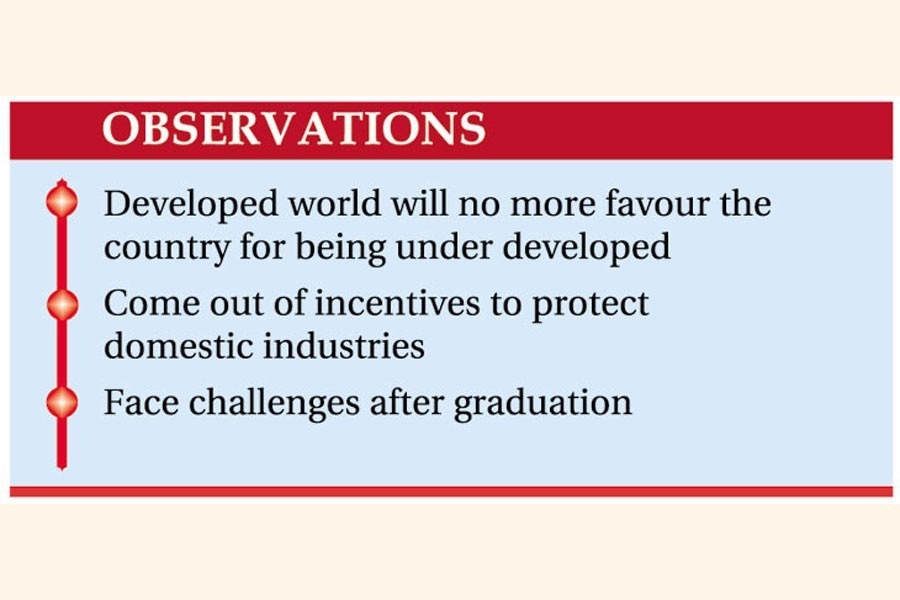Bangladesh needs to integrate all its development and trade policies to adopt a comprehensive strategy in the global or bilateral trade negotiations, speakers said at a dialogue on Sunday.
They also suggested focusing more on fortifying negotiation skills in both political and technical fronts to avoid potential trade losses after the country's graduation from the least-developed country (LDC) status in 2026.
The Centre for Policy Dialogue (CPD) and Friedrich-Ebert-Stiftung (FES) jointly organised the dialogue on "WTO-MC12 Outcomes: Next Steps for Bangladesh as a Graduating LDC" at CIRDAP auditorium in the city.
Bangladesh has to move to skill-based competitions from the existing preference-based trade competition to sustain its economic growth after the graduation, said Member of the Parliamentary Standing Committee on Ministry of Commerce Yussuf Abdullah Harun, who was chief guest of the event.
"We need to come out of the trade facilitation measures like cash incentives, subsidies on exports, excessive protection for domestic industries, etc. as most of those initiatives already proved to have been ineffective," he added.
For better trade negotiations, he suggested doing a lot of homework based on inclusive research before engaging in negotiations with the trade partners.
Senior Secretary of Commerce Tapan Kanti Ghosh was the special guest of the dialogue and the Federation of Bangladesh Chambers of Commerce and Industry (FBCCI) President Md Jashim Uddin was the guest of honour.
Director General of WTO Cell at the MoC Md Hafizur Rahman and former Member of Bangladesh Trade and Tariff Commission Dr Mostafa Abid Khan spoke as the distinguished discussants.
Chaired by CPD Distinguished Fellow Dr Debapriya Bhattacharya, CPD Distinguished Fellow Professor Mustafizur Rahman presented the keynote paper and FES Resident Representative Felix Kolbitz made the introductory remarks.
Referring to the outcome of 12th World Trade Organisation Ministerial Conference (WTO-MC12) held in Geneva in June last, Dr Bhattacharya noted that the WTO is no more exclusive about the old-fashioned negotiations on trade preferences where developed countries would open their market unconditionally for the under-developed ones.
From that perspective, the outcome of MC12 shouldn't be judged only through the eyes of LDCs, he said, adding that under the current geopolitical and economical situation in the world, the WTO had to go through a lot of stress to successfully arrange a meeting.
Mentioning that the WTO's concentration has been shifting from products to production processes, he said, "Apart from trade policies, we need to address non-trade issues like climate change, labour rights, and human rights in trade discourse in the near future."
Stating that there is a disjuncture between political and technical narrative about the country's trade strategy, he added, "In the global or bilateral trade negotiation table, there should be one narrative of trade discussion."
He also said that in terms of trade policy, Bangladesh needs to go on an offensive approach with a changed mindset that the developed world will no more favour the country for being under-developed.
Besides, the CPD distinguished fellow suggested the government to integrate all the policies with focus on three components - smooth LDC transition strategy, implementation of SDGs, and post-Covid recovery plan - to take advantage of any negotiations.
In a presentation, Professor Rahman said the LDC graduation-related issues were not in the main agenda at the last WTO-MC12 as powerful economies had other priorities to discuss there.
As a result, the issues raised by the 12 countries set to graduate from LDCs were watered down at the conference despite two days extension of the ministerial conference, he said.
Referring to the CPD's estimation made in 2018 that Bangladesh may lose 14 per cent of its export equivalent of US$ 2.2 billion after LDC graduation, he said there is still four years along with two to three years of extension likely by several other economic blocs, Bangladesh needs to do extensive homework to avoid such losses.
Out of the combined losses to be faced by the 12 LDCs, Bangladesh will have to bear the 90 per cent due to the size of its economy compared to the other countries, the trade expert added.
The CPD distinguished fellow also said, "There should be a separate and dedicated negotiation cell to be formed by the government to place the country's trade interests in the global, regional and bilateral trade forums."
Besides, the government should also hold bilateral discussions with countries like the UK, Canada, China, India and Japan for some extension in the preferential trade opportunities.
The senior secretary of commerce said that in terms of signing bilateral free trade agreement (FTA) or preferential trade agreement (PTA), not just Bangladesh, the partnering countries are also required to be interested.
Additionally, to attract more foreign direct investments (FDIs), he suggested better country branding.
Mr Ghosh also said that as the WTO is not doing enough to facilitate the LDCs, Bangladesh will have to take effective policies to survive the challenges after the graduation with its own resources.


